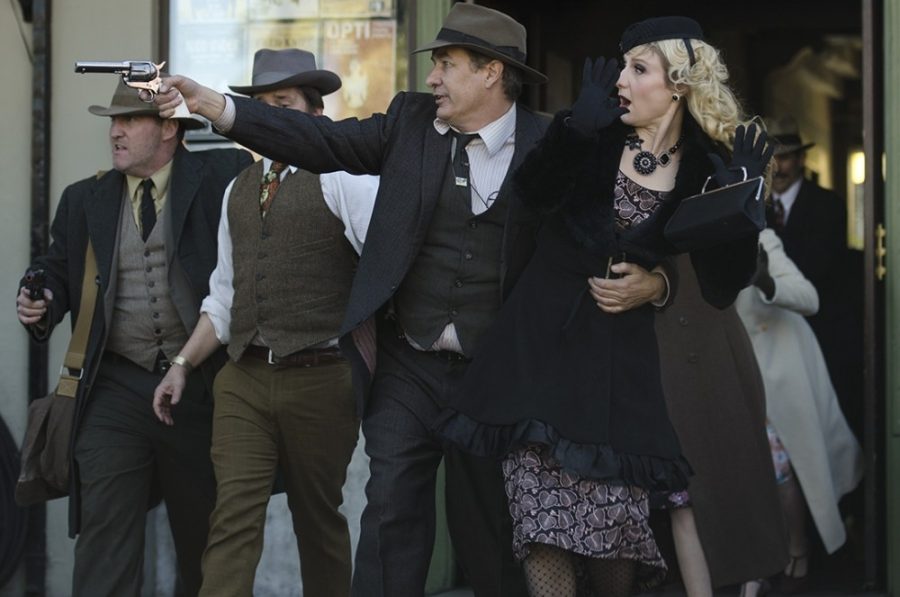Dillinger Days, an annual event that marks the capture of John Dillinger in Tucson, hits Hotel Congress in downtown Tucson this weekend. Jonathan Mincks, also known as Johnny Hotshot, Mad Mincks and a list of other names, will be starring in the event’s re-enactments as Dillinger, a role he has played for 23 years. He sat down with the Daily Wildcat and discussed his career and what has helped him make it this far.
Daily Wildcat: How did you get into acting?
Jonathan Mincks: I started performing on the street when I was 10 years old, performing magic on the street. I was taught by a guy named Peter Rabbit, a magician.
I started performing professionally on Fourth Avenue in front of an old bar from way back in the day called Cho Chos, later called the Night Train. I started performing magic, and I knew when I was making people laugh and they were giving me money.
I figured out then what I was going to be doing for the rest of my life.
RELATED: BFA musical theatre major talks life as a student actor
DW: How do you feel about Dillinger personally?
JM: Dillinger is one of those iconic characters from America’s history.
Why did criminals like Jesse James or Billy the Kid or John Dillinger become popular in their time and then live on in history? Whether it be a romantic version of them or an actual recount of their tales, why did these characters live on?

DW: Do you have a favorite nickname or a story about how you got a certain nickname?
JM: (Laughs) Well I thought my name was “asshole” until I was 17 years old. The one I use most is Hotshot, and the way I got that was auditioning for old gunfights at Old Tucson Studio[s].
A stunt of the audition included a dive, tuck and roll, sticking up a pistol and aiming it, coming up to a kneeling shooting position. So I thought this was just silly because it is a basic stunt, and by that time we had done most of the stunt parts of the audition. There was a panel of three judges that were writing things on a table about us and a stuntman taking us through the audition.
A couple of guys did their dive, tuck and roll, but it was my time to go and a table set to the side. I did a dive, tuck and roll over the table, grabbed the gun and pointed it right at the table of judges. And when I came up from my kneeling position and asked, “Do I get the part?” the stuntman said, “Just get back in line, hotshot.”
DW: Do you have any favorite actors who you look up to?
JM: I tend to like Douglas Fairbanks Jr., Lon Chaney, Bruce Lee, Robert Conrad and Barney Rubble.
Lon Chaney has an incredible way to project emotion and feeling and to basically be unrecognizable from role to role. Douglas Fairbanks just uses his abilities to make everything thrilling and fun. Bruce Lee is dedication and perfectionism, not just in acting but in stunt fights and detail. And Barney Rubble, because who can beat Barney Rubble?
DW: You are also a stuntman. Have you ever gotten injured doing a stunt?
JM: There have been some bumps and bruises along the way but nothing too drastic that I would take back, I think. Injuries during stunts are only because you work up to it or practice enough to make it safe or you went too fast. Ninety percent of the time, it is the actual stuntman’s fault.
As for my craziest stunt, you don’t get much crazier than doing a 25-foot-high fall for six months twice a day at minimum wage at a stunt. This was at a theme park, and I was the only person who could do it, so that is my craziest stunt.
DW: When you are not acting, what do you do for fun?
JM: I teach. Well, for fun, I do a lot of different jobs. I teach a desert survival and backpacking specialist class and teach at the Arizona Hiking Shack. I teach AHS hikes and educational hikes and lead education hikes and I like getting out into the wild.
And I am pretty much a gear nut, so I like playing with gear and modifying gear and equipment. That is not a good answer! For fun what do I do? Games baby!
DW: When you are rehearsing or acting, what is your mindset? Are you more focused or laidback, or how do you attack roles?
JM: I find that every role is different and requires different things. Sometimes it may be a simple physical thing that just clicks at some point, where a simple physical thing makes that character work.

There is how they were raised, where they were raised. People walk differently when they were raised in different places. You put somebody from Tucson and somebody from Minnesota in a field and tell them to run in bare feet, and they are going to run different. That person from Tucson is going to be looking for stickers everywhere. It is just little things that change everything about us. Those are environmental things, those are social things, to make a character different … When I was 5 years old, I was playing Spider-Man in my backyard and I was shooting webs and punching the Green Goblin.
What I do today is the same thing; I am still playing Spider-Man but there is an audience. Nobody has to know what is going on but me. I made my career out of letting my audience know what was happening and that is the difference.









